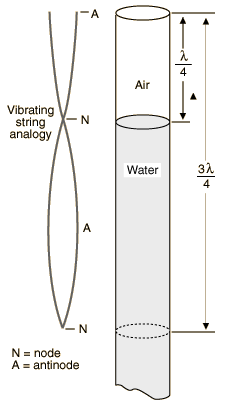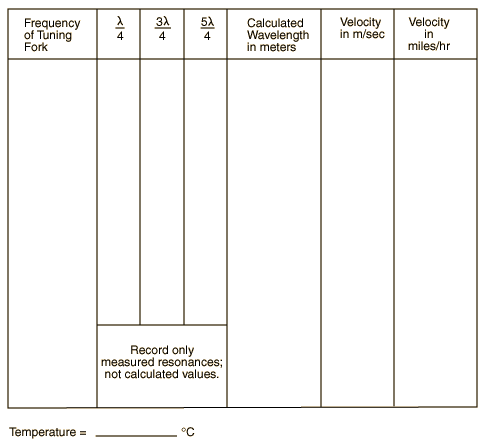Resonance Tube: Velocity of Sound
Object: To observe the resonance phenomenon in an open ended cylindrical tube. To use the resonance to determine the velocity of sound in air at ordinary temperatures.
Introduction: The velocity with which sound travels in any medium may be determined if the frequency and the wavelength are known. The relationship between these quantities is:
| v = fl where |
v = velocity of sound propagation f = frequency l = wavelength |
In this experiment the velocity of sound in air is to be found by using tuning forks of known frequency. The wavelength of the sound will be determined by making use of the resonance of an air column.
|
The apparatus for the experiment consists of a long cylindrical plastic tube attached to a water reservoir. The length of the water column may be changed by raising or lowering the water level while the tuning fork is held over the open end of the tube. Resonance is indicated by the sudden increase in the intensity of the sound when the column is adjusted to the proper length. The resonance is a standing wave phenomenon in the air column and occurs when the column length is: where l is the sound wavelength. The water surface constitutes a node of the standing wave since the air is not free to move longitudinally. The open end provides the conditions for an antinode, but the actual antinode has been found to occur outside the tube at a distance of about 0.6 r from the end, where r is the tube radius. This end correction may be added to get a more accurate value if only one resonance can be measured, but it is usually more convenient to eliminate this "end effect" by subtracting the resonance length for l/4 from those for 3 l /4, 5l /4, etc. |

|
Procedure:
1. Fill the tube nearly full of water. Strike one of the tuning forks with the rubber mallet supplied and hold it above the water column. Caution: do not touch the tube with the tuning fork - the rapidly moving fork can break the plastic.
2. Using the moveable water reservoir, lower the water surface slowly, listening for amplification of the tone. When a resonance is found, a pronounced reinforcement of the sound will be heard. Move the water surface up and down several times to locate the point of maximum sound intensity and mark that point with a rubber band on the outside of the tube.
3. Lower the water further to find the next resonant length. Continue in this manner as far as the length of the tube will permit. Obtain the lengths l/4, 3l/4, etc. in meters from your measurements. You will need to check to see if your column lengths follow the progression 1, 3, 5, 7, -- since you may have missed a resonance or counted one of the fainter spurious resonances which sometimes occur. Calculate the wavelength and velocity of sound.
4. Repeat the procedure for the other tuning forks supplied. The velocity in miles per hour may be found by multiplying the velocity in m/sec by the factor 2.24. Please record the room temperature for reference since the velocity of sound increases with increasing air temperature.

Equipment: Resonance Tube
- Three different tuning forks for each
- hammer for tuning forks
- Resonance tube apparatus
- Plastic beaker for each and a few of the bulbs for removing water
Apparatus movie